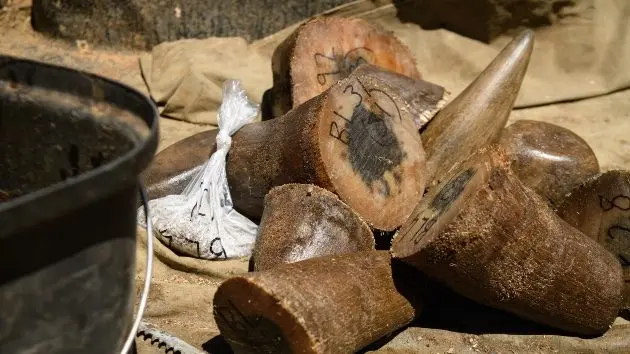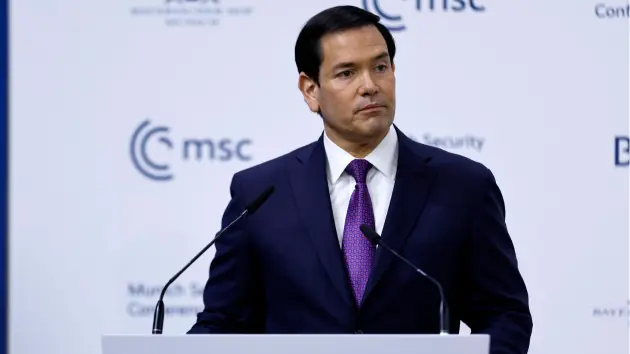
(LONDON) — Six suspects accused of orchestrating one of South Africa’s largest rhino horn trafficking operations appeared in court Tuesday following a 7-year investigation that uncovered a scheme involving 964 rhino horns destined for illegal markets in Southeast Asia, authorities said.
The arrests mark what officials are calling a “decisive victory” in the country’s fight against international wildlife crime, as South Africa continues to battle a poaching crisis that claimed 420 rhinos in 2024 alone.
Among those arrested was John Hume, 83, the controversial former owner of the world’s largest rhino farm who once bred about 2,000 white rhinos, roughly an eighth of the global population, before selling his operation to African Parks in 2023.
Alleged fraudulent permit scheme exposed
The six suspects, aged between 49 and 84, surrendered to the South African Police’s elite Hawks unit at Sunnyside Police Station before appearing in Pretoria Magistrates’ Court on charges including fraud, theft and violations of environmental protection laws.
Prosecutors allege the syndicate defrauded the Department of Forestry, Fisheries and the Environment by obtaining permits under false pretenses to buy and sell rhino horns domestically, while actually funneling them into illegal international markets.
The investigation involved the SAPS Hawks’ Wildlife Trafficking Section, the Department’s enforcement unit known as the Green Scorpions, and the National Prosecuting Authority. Additional charges of racketeering and money laundering are under consideration, officials said.
While South African law permits domestic trade in rhino horn with valid government permits, international commercial trade has been banned since 1977 under the Convention on International Trade in Endangered Species of Wild Fauna and Flora.
‘Rhino baron’ among the accused
Hume, once dubbed South Africa’s “rhino baron,” spent decades and an estimated $150 million advocating for legalizing international rhino horn trade, arguing that flooding the market with ethically harvested horns would reduce poaching.
He was granted bail of 100,000 rand (about $5,600), while his co-accused received bail ranging from 2,000 to 10,000 rand.
The other suspects include Hume’s relative, Clive Melville, who was previously accused in 2019 of illegally transporting 167 rhino horns; attorneys Izak du Toit and Catharina van Niekerk; insurance broker Mattheus Poggenpoel; and game reserve manager Johannes Hennop.
Poaching crisis continues
The arrests come as South Africa, home to 80% of the world’s remaining rhinos, grapples with an ongoing poaching crisis. Despite a 15% decrease in poaching deaths from 2023 to 2024, 103 rhinos were killed in the first three months of 2025, more than one per day, according to government figures.
KwaZulu-Natal province has emerged as the epicenter, though dehorning initiatives showed promise after the province saw poaching losses drop nearly 30% in 2024. However, criminal syndicates quickly adapted, targeting even dehorned rhinos for their horn stumps by November 2024.
The illegal trade is reportedly driven by demand in Vietnam and China, where the horns are used in traditional medicine despite no proven medicinal value.
Rhino horn can fetch more than $60,000 per kilogram on the black market, a commodity more valuable than gold, platinum or diamonds, according to the United Kingdom’s Department for Environment, Food & Rural Affairs.
South African Environment Minister Dr. Dion George called the arrests “a powerful demonstration of South Africa’s resolve to protect its natural heritage.”
“This complex investigation shows that our enforcement agencies will not hesitate to pursue those who plunder our wildlife for criminal profit,” George said.
ABC News’ Liezl Thom contributed to this report.
Copyright © 2025, ABC Audio. All rights reserved.



